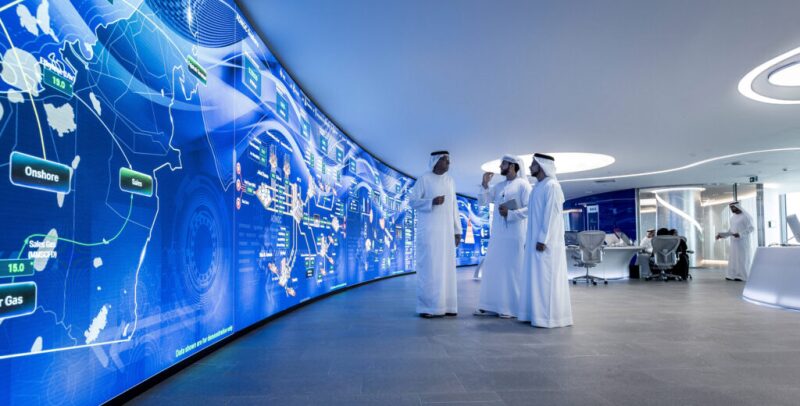Alan Nelson is 1 year into his new job as the chief technology officer of the Abu Dhabi National Oil Company (ADNOC). It is a new job for ADNOC too.
He is the first person to ever hold the title of CTO at the almost 50-year-old oil and gas producer, a fact he said reflects “a new mandate” to further invest in science and technology. The fruits of the approach are funneled into the organization via three core areas: innovation (i.e., research and development), the digital transformation, and sustainability.
“One of the key reasons why sustainability reports into the CTO is of course that this will require new technologies,” said Nelson. “Some technologies that we can see today, that we could scale up and implement. Other technologies that are yet to be developed but that we need to develop in order to continue to be a sustainable company.”
And like many of the integrated oil companies, the last downturn sparked a drive within the organization to seek out or develop emerging technologies to bring a new order of automation and lower operating costs.
Under Nelson’s brief tenure, ADNOC has already made several big moves toward this goal including a partnership with Saudi Aramco to open a research center in the UK that will focus on creating nonmetallic technologies to limit the industry’s exposure to costly corrosion issues.
This was accompanied by a raft of other partnerships and joint-venture projects that aim to create new artificial intelligence programs. The biggest of them is a 10-year contract with Honeywell which was selected to deploy its predictive maintenance platform across the company’s upstream and downstream assets.
One of the other major initiatives Nelson oversees today is known as the Panorama Digital Command Center. Panorama leverages advanced computing tools such as artificial intelligence and digital twins to make the company’s oil fields accessible remotely.
Earlier this month, ADNOC reported that the center delivered over $1 billion in value since it was launched 3 years ago. Nelson spoke about how the project prepared his company for the highly disruptive consequences of a global pandemic in an interview with SPE Live.
“Through our Panoramic Digital Command Center we have real-time data at our fingertips—this is data that is updated second by second. So we can track the performance of our assets in real time, and by that we keep our people as safe as we possibly can,” said Nelson.
Below are some of the highlights from the interview.
What Modernization Means at ADNOC
“For us, it means staying relevant, it means staying ahead of the curve. The world is changing, and we all know that we’re going through that now—whether it’s the current pandemic situation that we’re all having to work through and navigate, or whether it’s the current oil and gas price.”
Nelson elaborated on the elements he considers necessary to achieving relevancy. “First and foremost is culture. In order for the company to maintain that bleeding edge on science and technology, you have to have innovation as a part of company culture.
“You have to be willing to take risks, you have to be patient, and impatient at the same time … You have to set clear ambitions, targets, and goals for what you expect that science and technology do for the company. What do you expect in terms of revenue? What do you expect in terms of profit? What do you expect in terms of efficiency gains?”
ADNOC’s Technology Investment Strategy
Investing in fast-emerging technologies is a lot like aiming at a moving target. Sometimes you hit a bullseye, but it is far more common for a technology to miss the mark and never see broad commercialization. Despite the risks, oil companies are increasingly aware that they must have skin in the game at even the earliest stage of development to improve the odds.
“I always look at an innovation portfolio as investing—as a set of call options if you will,” Nelson said. “And what I mean by that is that you need to place multiple bets across your entire portfolio.”
He added that a too conservative portfolio means a company has security but “very little gain.” As more risk is taken on innovation investing, just like in the stock market, more volatility is introduced.
Nelson shared that some of the keys to wise investing lie in “understanding how much we should invest in each bucket and when to stop projects. This is always a challenge for R&D organizations and digital organizations alike. When do we continue to fund? When do we stop?”
He said the answer to these questions come via a “continual testing methodology” that ADNOC has embedded within its overall innovation strategy.
ADNOC’s Philosophy on Digital Adoption
Figuring out which part of a company to focus technology investment on has in the past slowed down efforts to adopt new digital tools. This bottleneck can be eased if an organization knows how to define its most pressing problems.
“Once you understand exactly what you want to try to solve, the answer becomes relatively straightforward. It may not be easy to get the answer, but it becomes much easier to see the path to go from where you're at today to where you want to go,” he said.
“For example, when we started looking at predictive maintenance, we didn’t launch predictive maintenance across every single unit operation process, that's an intractable problem.
“So what we have to do is to understand where digital can have the greatest impact to begin with. What are those unit operations that predictive maintenance can come in today to really move the needle and also help the organization understand the value, such as that we can continue to deploy it?”
A Pandemic Reveals the Importance of Digital
Companies around the world were caught unprepared for the sudden shift to work from home and remote operations. But one thing keeping enterprises tied together is their recent technology investments.
For some, that means a heavier reliance on teleconferencing software. For integrated oil and gas companies, it goes further and includes augmented reality headsets that use cameras and the internet to keep workers connected and minimize the number of hands in the field. Nelson said this is just one real-world example of how ADNOC is coping with the personnel constraints imposed by the COVID-19 pandemic.
“Today, a lot of people and a lot of companies are realizing the impact of digital—and many of them were forced into the appreciation of digital given the current pandemic situation,” he said, noting that companies around the world have been caught unprepared for the sudden shift to work from home and remote operations.
“We on the other hand have embraced digital for many years. Through our Panorama Digital Command Center, for example, we have access to real-time data, whether we’re in the office, or whether we're working remotely. And that enables good decision making, good judgment anywhere around the world so we were well prepared for this type of situation even though we couldn't forecast it, and I don't think anyone could have predicted anything like this would have happened.”
ADNOC’s 2030 Sustainability Strategy
Nelson also explained that Panorama bridges the gap between the digital transformation and the company’s sustainability goals. Using the system’s digital twin element, ADNOC is able to test operating scenarios to balance production output with emissions targets.
“Whether you think of sustainability, or you think of ESG (environment, social, governance), our strategy encompasses all of those different areas. So for example, earlier this year, we announced that we will reduce our CO2 intensity by 25%. By the year 2030, ADNOC will reduce our freshwater intake to less than 0.5% of the total water intake—these are very ambitious goals.”

Alan Nelson the Chief Technology Officer (CTO) for Abu Dhabi National Oil Company (ADNOC) where he is responsible for leading the company’s innovation strategy, digital and artificial intelligence development and deployment, and corporate sustainability across the ADNOC group of companies. He has served on the Board of Directors for The Faraday Institution, American Institute of Chemical Engineers (AIChE), Centre for Chemical Process Safety (CCPS), and Primet Precision Materials. He is a Fellow of AIChE and IChemE, a licensed professional engineer (Canada) and a Chartered Engineer (United Kingdom).


